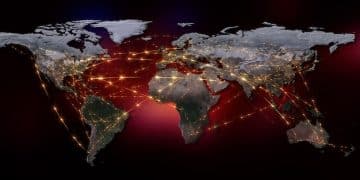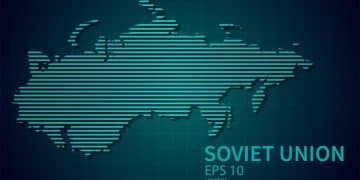Decoding US Sanctions: What Businesses Must Know Now

Advertisements
Navigating the intricate landscape of US sanctions is paramount for businesses to ensure compliance, mitigate risks, and seize opportunities, as recent developments necessitate a thorough understanding of their multifaceted implications across global operations and supply chains.
In an increasingly interconnected yet volatile global economy, understanding the nuances of international regulations, particularly US sanctions, is not merely prudent enterprise—it’s a critical imperative. This article aims to provide a comprehensive guide on decoding the latest US sanctions: what businesses need to know now, ensuring your operations remain compliant and resilient in an ever-shifting geopolitical landscape.
understanding the evolving landscape of US sanctions
The United States employs sanctions as a primary tool of foreign policy, aiming to influence the behavior of targeted entities, whether countries, organizations, or individuals. These measures are designed to restrict economic activity, such as trade, financial transactions, and investment, with the ultimate goal of achieving specific national security or foreign policy objectives. The dynamic nature of these sanctions means businesses must continuously monitor updates to remain compliant and avoid severe penalties.
Sanctions are not static; they evolve in response to global events, shifts in political priorities, and emerging threats. This constant evolution necessitates a proactive approach from businesses, moving beyond mere compliance to a strategic understanding of how these powerful economic tools shape global commerce. The Office of Foreign Assets Control (OFAC) within the U.S. Department of the Treasury is the primary agency responsible for administering and enforcing most U.S. sanctions programs. Their comprehensive lists, advisories, and guidance are indispensable resources for any entity engaged in international trade or finance.
types of sanctions and their implications for businesses
US sanctions generally fall into several categories, each with distinct implications.
- Comprehensive Sanctions: These are broad prohibitions on virtually all direct and indirect transactions with a targeted country, region, or regime. Examples include programs targeting Cuba, Iran, and North Korea, which often create significant operational challenges for businesses with even tangential connections to these areas.
- Targeted Sanctions: More common and increasingly preferred, these sanctions focus on specific individuals, entities, or sectors. They aim to minimize harm to innocent populations while maximizing pressure on rogue actors. Examples include sanctions related to terrorism, narcotics trafficking, or human rights abuses, often implemented through designations on the Specially Designated Nationals (SDN) List.
- Secondary Sanctions: These are particularly impactful as they target non-US persons for engaging in certain transactions with sanctioned individuals or entities, even if those transactions do not involve a US nexus. This extraterritorial reach extends the compliance burden far beyond US borders.
The impact on businesses can range from restrictions on imports and exports to asset freezes, prohibitions on financial transactions, and even reputational damage. Non-compliance can result in substantial fines, criminal charges, and exclusion from the US financial system. Therefore, understanding the specific type of sanctions in play is the first step toward effective risk management and ensuring uninterrupted operations.
Beyond the direct legal and financial ramifications, sanctions can also disrupt supply chains, complicate banking relationships, and necessitate costly due diligence processes. The cumulative effect can significantly increase operational costs and reduce market access. Businesses must integrate sanctions compliance into their broader risk management framework, adapting internal controls and training programs to reflect the latest regulatory changes and enforcement trends.
identifying key shifts in recent US sanctions policy
Recent shifts in US sanctions policy demonstrate a growing emphasis on precision, expanded jurisdictional reach, and increased focus on emerging technologies. These trends are not mere continuations; they represent significant strategic adjustments requiring careful consideration from the business community. One notable shift is the increased use of the Global Magnitsky Human Rights Accountability Act, allowing the US to sanction individuals involved in severe human rights abuses and corruption worldwide, regardless of their nationality.
Another critical development is the heightened focus on circumvention and sanctions evasion tactics. Authorities are increasingly scrutinizing complex financial arrangements, shell companies, and the use of cryptocurrencies to bypass restrictions. This means businesses must not only understand who is sanctioned but also how sanctioned entities might attempt to operate covertly, demanding more sophisticated due diligence and monitoring practices.
thematic priorities: technology, human rights, and strategic competition
The current US administration has clearly articulated several thematic priorities guiding its sanctions policy, moving beyond traditional geopolitical concerns to address broader issues:
- Technology Export Controls: There is a growing convergence between sanctions and export controls, particularly concerning technologies that could be used for military applications or human rights abuses. Restrictions on semiconductor technology, artificial intelligence, and quantum computing capabilities are becoming more prominent, directly impacting tech companies and their supply chains.
- Human Rights and Democracy: Building on the Global Magnitsky Act, sanctions are increasingly deployed to address human rights violations, including those related to forced labor, political oppression, and atrocities. This creates compliance challenges for companies sourcing goods globally, requiring deeper scrutiny of labor practices within their supply chains.
- Strategic Competition: Sanctions are a key instrument in strategic competition with rival powers. This includes measures designed to limit access to critical technologies, restrict financial flows, and counter influence operations. Businesses operating in sensitive sectors, or with significant ties to countries deemed strategic rivals, face heightened scrutiny and compliance burdens.
These thematic shifts underscore a more proactive and values-driven approach to sanctions. Businesses must therefore not only screen for sanctioned entities but also assess the ethical and geopolitical context of their operations. This demands a more holistic risk assessment, integrating ESG (Environmental, Social, and Governance) factors with traditional compliance considerations.
Furthermore, the US is increasingly coordinating its sanctions efforts with allies and partners, amplifying their economic impact and broadening their international legitimacy. This multilateral approach means that businesses must also consider the sanctions regimes of other major economic blocs, such as the European Union and the United Kingdom, to ensure comprehensive compliance. Divergences in these regimes can create complex jurisdictional challenges, necessitating meticulous legal advice and sophisticated compliance software.

operational impact on businesses: challenges and responsibilities
The operational impact of US sanctions is multifaceted, extending far beyond direct financial penalties. Businesses face a range of challenges, from disruptions in supply chains to heightened customer due diligence requirements and the need for robust internal compliance programs. The sheer volume and complexity of regulations demand significant investment in compliance infrastructure and expertise.
Perhaps one of the most immediate challenges is maintaining an up-to-date and accurate understanding of the various sanctions lists, such as OFAC’s SDN list or the Commerce Department’s Entity List. Screening customers, partners, and transactions against these lists is a continuous and resource-intensive process. Errors can lead to inadvertent violations, even if no malicious intent is present, resulting in severe penalties and reputational damage.
critical areas for enhanced due diligence
Businesses must enhance their due diligence processes in several critical areas:
- Supply Chain Transparency: Understanding the origin of all components, materials, and services is crucial. Sanctions can impact upstream suppliers, creating bottlenecks or legal risks if goods with sanctioned origins enter the supply chain. This requires mapping complex supply webs and continuously vetting suppliers.
- Financial Transactions: All financial intermediaries, including banks and payment processors, must be vigilant. Transactions involving sanctioned parties, even if indirect, can trigger violations. This extends to virtual assets, where anonymity can complicate tracing and compliance.
- Customer and Partner Screening: Beyond initial onboarding, continuous monitoring of customers, distributors, and joint venture partners is essential. A partner who was compliant yesterday might be sanctioned tomorrow, necessitating dynamic screening protocols.
Moreover, the rise of digital assets and blockchain technology presents new challenges for sanctions compliance. The pseudonymous nature of some cryptocurrencies can make it difficult to identify the true beneficial owners of funds, potentially facilitating sanctions evasion. Regulatory bodies are increasingly focused on this area, and businesses involved in virtual asset services must implement stringent AML/CFT (Anti-Money Laundering/Combating the Financing of Terrorism) controls that incorporate sanctions screening.
Given the extraterritorial nature of some US sanctions, foreign subsidiaries and international partners of US companies also bear significant responsibilities. Even non-US entities can face consequences if their actions are deemed to facilitate sanctions evasion or if they fall under secondary sanctions provisions. This necessitates a global compliance strategy, ensuring that all entities within a corporate group adhere to the highest standards, irrespective of their local jurisdiction.
leveraging technology for robust sanctions compliance
In the face of escalating complexity, technology has emerged as an indispensable ally for businesses striving to maintain robust sanctions compliance. Manual processes are simply no longer sufficient to cope with the volume of data, the frequency of updates, and the nuances of ever-evolving regulations. Automation, artificial intelligence (AI), and advanced data analytics offer powerful solutions to enhance efficiency, accuracy, and risk management.
Compliance software platforms provide a centralized system for screening against multiple sanctions lists simultaneously, reducing the risk of human error and significantly speeding up the screening process. These platforms often incorporate real-time updates from regulatory bodies, ensuring that businesses are working with the most current information. Features like fuzzy logic matching can help identify potential matches even when names are misspelled or presented in different formats, a common challenge in international business.
essential technological solutions for compliance
Several technological solutions are proving essential for modern sanctions compliance:
- Automated Screening Tools: These tools integrate directly with existing enterprise resource planning (ERP) or customer relationship management (CRM) systems. They automatically screen new customers, vendors, and transactions against global sanctions lists, flagging potential hits for review by compliance officers.
- Artificial Intelligence and Machine Learning: AI/ML can analyze vast datasets to identify patterns indicative of sanctions evasion, such as unusual transaction volumes, complex ownership structures, or geographical anomalies. They can also help prioritize alerts, reducing the number of false positives and allowing compliance teams to focus on high-risk cases.
- Blockchain Analytics: For businesses dealing with cryptocurrencies, blockchain analytics tools are crucial. They can trace the flow of funds on distributed ledgers, identify links to known illicit addresses, and help in assessing counterparty risk in the crypto space.
Beyond these specific tools, a holistic approach to technology integration is key. This involves ensuring that compliance systems communicate effectively with other business functions, such as finance, legal, and supply chain management. Data silos can impede effective compliance, leading to overlooked risks or delayed responses to regulatory changes.
However, technology is not a panacea. It augments, rather than replaces, human expertise. Compliance officers still need to interpret results, investigate alerts, and make informed decisions based on a comprehensive understanding of the legal framework and business context. The effective deployment of technology requires strong governance, regular training for personnel, and a commitment to continuous improvement, adapting to both regulatory changes and technological advancements.
future outlook: emerging trends and proactive preparation
The landscape of US sanctions is continuously evolving, shaped by geopolitical dynamics, technological advancements, and shifting policy priorities. Prognosticating the future of sanctions is challenging, but several emerging trends suggest areas where businesses should proactively prepare. One significant trend is the increasing weaponization of economic interdependence, meaning sanctions are likely to become even more finely tuned instruments of foreign policy, aimed at specific capabilities or sectors rather than broad economic harm.
Another key trend is the continued focus on cyber-enabled sanctions, targeting malicious cyber actors and their facilitators. As cyberattacks become a pervasive threat to national security and economic stability, sanctions will play a critical role in deterring and punishing such activities. This will necessitate enhanced cybersecurity measures and due diligence regarding digital partners and platforms.
adapting to a world of persistent geopolitical flux
Businesses must adapt to an environment characterized by persistent geopolitical flux. This means moving beyond a reactive compliance mindset to a proactive risk management strategy that anticipates potential future sanctions. Building resilience into supply chains, diversifying markets, and fostering strong relationships with legal and compliance experts will be paramount.
- Scenario Planning: Regularly conduct scenario planning exercises to assess the potential impact of new or expanded sanctions on business operations, market access, and financial stability. This allows for the development of contingency plans and agile responses.
- Enhanced Geopolitical Intelligence: Invest in understanding geopolitical dynamics and the foreign policy objectives of the US and other major powers. This intelligence can provide early warnings of potential sanctions targets or thematic shifts.
- Flexibility in Operations: Design operational structures and supply chain arrangements that offer flexibility and redundancy. This reduces vulnerability to sudden disruptions caused by sanctions against specific countries, entities, or sectors.
Furthermore, the debate around the efficacy and unintended consequences of sanctions will likely intensify, potentially leading to further refinements in their application. While sanctions are powerful tools, their prolonged use can sometimes lead to humanitarian concerns or unforeseen economic repercussions. This ongoing policy discourse could influence future enforcement priorities and the design of new programs.
Finally, the growing importance of environmental, social, and governance (ESG) factors in investment and consumer decisions may also indirectly influence sanctions policy. As stakeholders increasingly demand ethical business practices, governments may be more inclined to use sanctions against regimes or entities engaged in practices that violate internationally recognized norms, adding another layer of complexity for businesses navigating global supply chains and partnerships. Proactive engagement with these evolving norms is not just about compliance, but about safeguarding reputation and long-term sustainability.

navigating the complexities of compliance frameworks
Navigating the intricate web of compliance frameworks is undeniably one of the most challenging aspects for businesses operating in a world shaped by US sanctions. It’s not just about adhering to OFAC regulations; it’s about understanding the interplay with other national and international laws, domestic export controls, and import regulations. This multi-layered regulatory environment demands a sophisticated and integrated compliance strategy that transcends departmental silos.
Compliance frameworks often involve establishing internal policies and procedures, regular employee training, robust due diligence processes, and continuous monitoring of transactions and relationships. The goal is to create a culture of compliance where every employee understands their role in preventing sanctions violations. This requires a commitment from top-level management to allocate sufficient resources and prioritize ethical conduct over short-term gains.
building a robust internal compliance program
A robust internal compliance program is the bedrock of effective sanctions management. Key components include:
- Risk Assessment: Conduct regular, comprehensive risk assessments to identify potential areas of exposure to sanctions, considering geographical presence, customer base, product lines, and operational models.
- Policy and Procedures: Develop clear, concise, and accessible policies and procedures that outline the company’s approach to sanctions compliance. These should cover screening protocols, reporting mechanisms, and escalation procedures for potential hits.
- Training and Awareness: Implement mandatory and recurring training programs for all relevant employees, including sales, finance, legal, and operational staff, to ensure they understand their obligations and the potential consequences of non-compliance.
Moreover, the compliance framework must be dynamic, capable of adapting quickly to new sanctions designations or shifts in enforcement priorities. This means having processes in place for rapid dissemination of information, timely updates to screening databases, and immediate adjustments to operational protocols when necessary. The ability to pivot swiftly can mean the difference between compliance and a costly violation.
Beyond internal controls, engaging with external experts, such as legal counsel specializing in sanctions law and compliance consultants, is often invaluable. These professionals can provide independent assessments, offer guidance on complex jurisdictional issues, and help interpret ambiguous regulatory language. Their insights can be particularly critical when dealing with novel transaction types or emerging markets, which may present unique compliance challenges requiring specialized knowledge. Ultimately, a proactive and well-resourced compliance framework is not merely a legal obligation but a strategic asset, safeguarding reputation and ensuring business continuity in a complex global environment.
addressing the ripple effect: supply chains and financial systems
The impact of US sanctions extends far beyond the directly targeted entities, creating a significant ripple effect across global supply chains and financial systems. Businesses, regardless of their direct involvement with sanctioned parties, must contend with potential disruptions and increased scrutiny. This ripple effect manifests in complex ways, from hesitant financial institutions to disrupted logistics and increased compliance costs for virtually all international trade.
Within supply chains, the presence of even a single sanctioned entity or restricted component can necessitate a complete overhaul of sourcing strategies. Companies may find that their traditional suppliers or freight forwarders become unwilling to engage in transactions, fearing secondary sanctions or reputational damage. This forces businesses to invest in extensive due diligence for every link in their chain, often requiring a deeper dive than previously considered necessary.
impact on financial intermediaries and beyond
Financial institutions, which serve as crucial gatekeepers, are particularly sensitive to sanctions risk. Banks face immense pressure from regulators to prevent funds from reaching sanctioned individuals or entities. This has led to a phenomenon known as “de-risking,” where financial institutions withdraw from relationships with clients or entire regions perceived as high-risk, even if those clients aren’t directly sanctioned. This can limit access to vital banking services for legitimate businesses operating in certain geographies or sectors.
- Correspondent Banking: US sanctions can severely impact correspondent banking relationships, making it harder for foreign banks to access the US financial system. This, in turn, complicates international payments and trade finance for their clients.
- Trade Finance: Securing trade finance – essential for imports and exports – becomes significantly more challenging when sanctions are involved. Lenders are wary of financing transactions that might inadvertently involve sanctioned goods or parties, leading to increased costs and reduced availability of credit.
- Insurance and Shipping: The ripple effect also extends to industries like insurance and shipping. Insurers may refuse coverage for vessels or cargo transacting with sanctioned regions, and shipping companies may avoid certain routes or ports, leading to higher transit costs and longer delivery times.
The cumulative effect of these challenges is a significantly higher cost of doing business internationally. Companies must allocate more resources to legal advice, compliance software, and internal teams dedicated to monitoring and managing sanctions risk. Moreover, the increased complexity can deter businesses from entering certain markets or pursuing otherwise lucrative opportunities, reshaping global trade flows and investment patterns. Understanding and anticipating these broader impacts is a critical component of strategic planning in the current global economic climate.
| Key Point | Brief Description |
|---|---|
| 📊 Evolving Policy Shifts | US sanctions are becoming more precise, focusing on technology, human rights, and strategic competition, requiring deeper business scrutiny. |
| 🔗 Supply Chain Scrutiny | Businesses need enhanced transparency and continuous due diligence across their entire supply chain to avoid unwitting violations. |
| 💡 Tech-Driven Compliance | Automated screening, AI, and blockchain analytics are crucial for managing complexity and ensuring accurate, efficient compliance. |
| 🌍 Global Ripple Effects | Sanctions impact financial systems, de-risking, and trade finance, increasing costs and complicating international business operations. |
frequently asked questions about US sanctions
US sanctions primarily fall into comprehensive, targeted (e.g., SDN list), and secondary categories. Comprehensive ones broadly prohibit transactions with specific countries, while targeted sanctions focus on individuals or entities. Secondary sanctions penalize non-US persons for dealings with sanctioned entities, extending the reach beyond US borders.
Foreign companies must comply with US sanctions if they have a ‘US nexus’ (e.g., US persons, dollar transactions, US-origin goods) or if they are subject to secondary sanctions. This often requires adopting US-style compliance programs, even without direct US presence, to avoid extraterritorial penalties.
Technology, including automated screening tools, AI, and blockchain analytics, is crucial for efficient sanctions compliance. It helps businesses manage vast amounts of data, identify potential risks, and ensure real-time adherence to ever-changing sanctions lists, reducing human error and improving overall risk management.
Non-compliance with US sanctions carries severe risks, including substantial financial penalties, criminal charges for individuals, reputational damage, and exclusion from the US financial system. It can also disrupt supply chains and lead to extensive legal costs and business disruptions.
Proactive preparation involves continuous monitoring of geopolitical developments, conducting scenario planning, enhancing supply chain resilience, and investing in geopolitical intelligence. Businesses should also regularly update their internal compliance programs and seek expert legal advice to adapt to emerging trends and policy changes effectively.
conclusion
Decoding the latest US sanctions: what businesses need to know now is not just a matter of avoiding penalties; it’s about navigating a complex global tapestry where regulatory landscapes and geopolitical realities intertwine. As sanctions become more precise, technologically advanced, and globally coordinated, businesses must embrace a proactive, technologically-driven, and holistic approach to compliance. This involves continuous monitoring, robust internal controls, strategic use of technology, and a deep understanding of the broader economic and political ripple effects. By doing so, companies can not only mitigate risks but also position themselves for resilience and sustainable growth in an increasingly volatile world. Ultimately, knowledge, agility, and a commitment to ethical conduct will be the cornerstones of successful international enterprise in the years to come.





